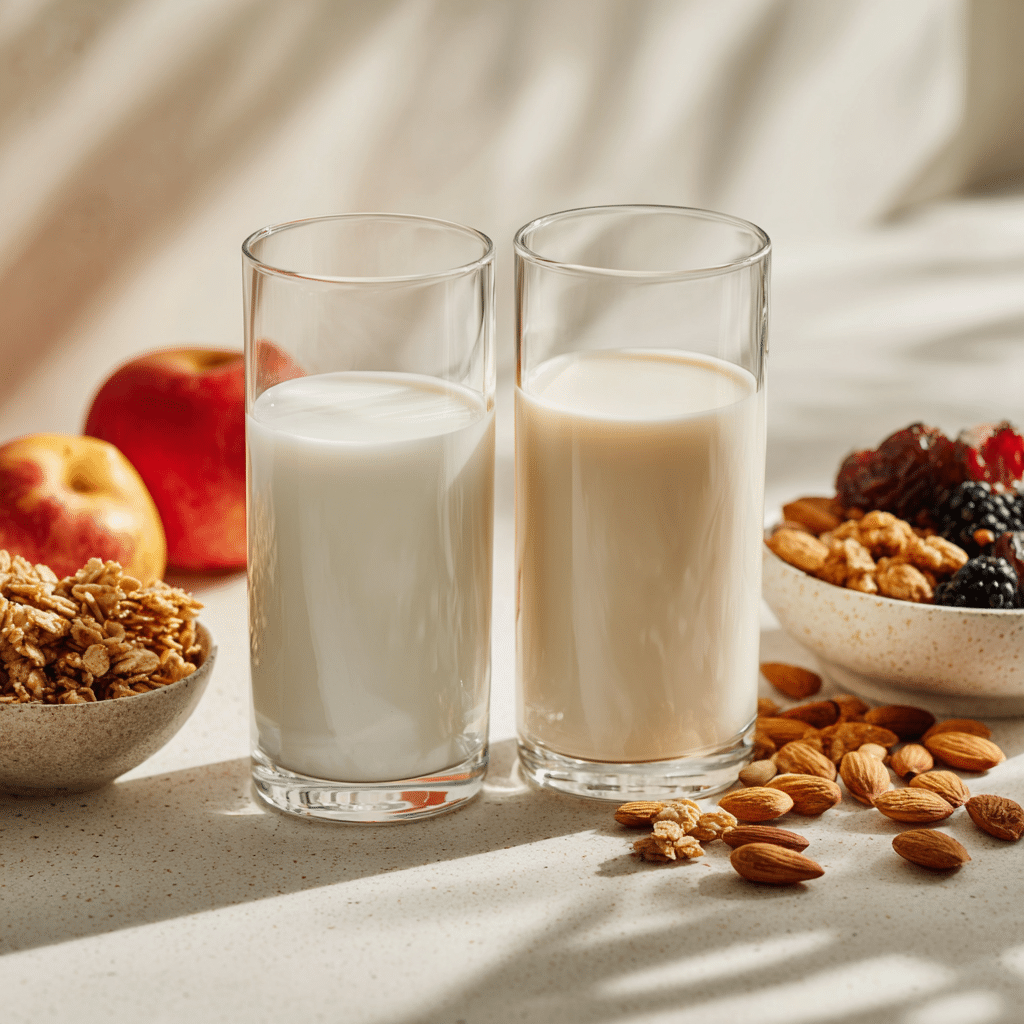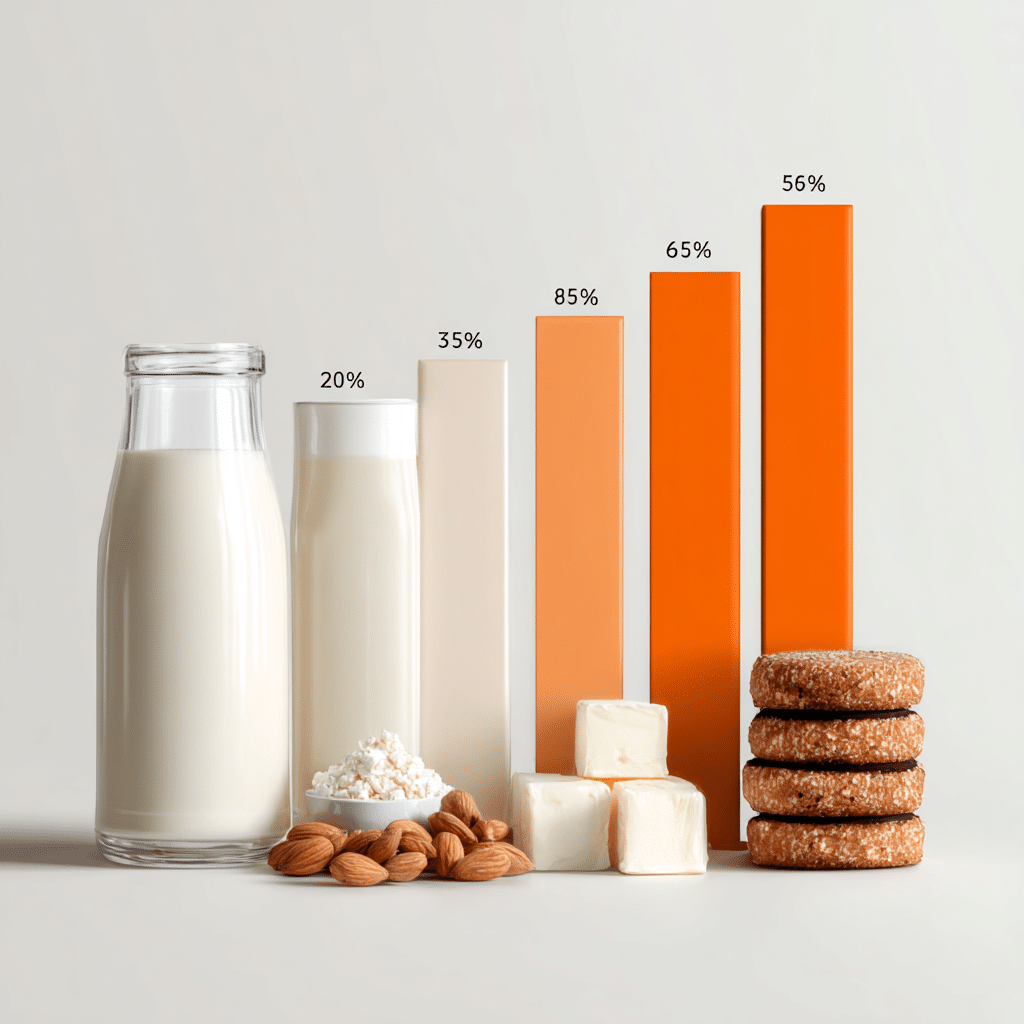When you compare almond milk vs dairy milk, the differences go far beyond the taste. One is plant-based, low in calories, and lactose-free. The other is rich in protein and naturally packed with calcium. Which one is better for your health? This article breaks it down with facts—no fluff. Whether you’re trying to lose weight, ease digestion issues, or find the right milk for your morning coffee, we’ll help you understand exactly how almond milk and dairy milk stack up nutritionally and practically.
Table of Contents
Table of Contents
What Made Me Look Closer at Almond Milk vs Dairy Milk
The Switch That Started in My Coffee Cup
For years, I didn’t think twice about pouring dairy into my coffee or cereal. Then, out of nowhere, my stomach started reacting badly. I felt bloated, foggy, and off after my usual latte. A friend suggested trying almond milk. I was skeptical, but I gave it a shot.
It didn’t taste the same—but I noticed something else: I felt better. Lighter. Clearer. That small switch made me wonder what else I didn’t know about almond milk vs dairy milk—and whether I’d been ignoring better options all along.

Why the Almond Milk vs Dairy Milk Question Matters
It’s easy to assume almond milk is just a “trendy” option. But more people are making the switch for real health reasons. Others stick with dairy because it’s familiar and protein-rich. Both sides make good points. That’s why understanding almond milk vs dairy milk is more relevant than ever.
In this article, you’ll get a side-by-side comparison of calories, fat, calcium, and more. You’ll also see when it makes sense to substitute almond milk for dairy—and when you might not want to. Whether you’re making smoothies, baking, or just pouring it into your coffee, this guide will help you make the smartest choice for your body and your goals.

Almond Milk Smoothie
Ingredients
Method
- In a high-speed blender or food processor, add almond milk, frozen banana, and almonds. Blend until thick and smooth.
- Add the cinnamon and ice, then blend again until your desired consistency is reached.
- Pour into glasses and enjoy immediately.
Nutrition
Notes
- You can use any unsalted nuts or seeds as a substitute.
- To store: Best enjoyed within 1–2 hours, or store in the fridge up to 2 days. Stir well before drinking.
- To freeze: Freeze in ice cube trays or bags for up to 6 months. Reblend before serving.
Tried this recipe?
Let us know how it was!Nutrition Showdown – What’s Really in Your Glass?
Calories, Protein, and Fat: Which Milk Fits Your Diet?
Let’s get into the core of almond milk vs dairy milk—what’s in each cup, and how it impacts your health.
Here’s a quick breakdown based on 1 cup (240 ml):
| Nutrient | Almond Milk (Unsweetened) | Dairy Milk (Whole) |
|---|---|---|
| Calories | 30–40 | 150 |
| Protein | 1g | 8g |
| Fat | 2.5g (mostly unsaturated) | 8g (including saturated) |
| Sugar | 0g (unsweetened) | 12g (natural lactose) |
| Calcium | 40–45% (fortified) | 30% (natural) |
Almond milk is lower in calories and sugar, while dairy milk provides more protein naturally. If you’re cutting calories or avoiding lactose, almond milk is an easy win. If you need more protein—especially for kids, athletes, or vegetarians—dairy might be better unless you’re supplementing elsewhere.
Fortification, Additives & Taste: What Else to Consider
Here’s where the almond milk vs dairy milk choice gets more personal. Most almond milks are fortified with vitamins like D, B12, and calcium—making them strong nutritional players. But some versions include thickeners or sweeteners that reduce their health value.
Dairy milk, on the other hand, is naturally rich in nutrients—but also comes with saturated fat and lactose, which can be problematic for digestion or heart health.
Taste is subjective, but it matters. Almond milk has a light, nutty flavor, while dairy milk is creamy and richer. If you’re switching purely for health reasons, start with unsweetened almond milk to get the cleanest option.
Want to visually compare other plant-based options? Follow us on Pinterest for helpful charts, dairy-free swaps, and smart nutrition ideas you can save and try anytime.
Can You Swap Almond Milk for Dairy Milk in Everything?
Using Almond Milk in Coffee, Recipes, and More
One of the most common questions in the almond milk vs dairy milk discussion is whether you can use them interchangeably in daily life. The answer? Sometimes yes, sometimes not quite.
In coffee and smoothies, almond milk works beautifully. It blends well, especially when warmed, and adds a subtle nutty flavor. Barista versions froth better, making them ideal for lattes and cappuccinos.
In baking and sauces, almond milk usually substitutes well—just keep in mind that it’s thinner and less creamy. You may need to adjust texture or fat elsewhere in the recipe. For example, a bit of coconut cream can help balance moisture in dairy-free cakes.
Where almond milk struggles is in recipes that rely heavily on dairy fat or protein structure—like custards, creamy sauces, or yogurt-making. For these, dairy or richer substitutes like oat or soy milk may give better results.
When Almond Milk Wins (and When Dairy Still Has a Role)
So, in the real-life battle of almond milk vs dairy milk, who wins? That depends on the job:
- For lightening up your diet: Almond milk clearly comes out ahead—lower in calories and fat.
- For digestion issues: Almond milk is lactose-free and gentler on most stomachs.
- For protein needs or growing kids: Dairy milk delivers more naturally.
- For ethical or environmental reasons: Almond milk is plant-based and often preferred by those avoiding animal products.
If you’re trying to lose weight or reduce inflammation, almond milk is a smart switch. But if you rely on milk for muscle-building or cooking richness, you might choose dairy or add in extra nutrients elsewhere.
The best solution for many people? Keep both on hand. Use almond milk for smoothies and cereal, and dairy where it truly matters—like in classic recipes or when you need that full flavor and body.

Frequently Asked Questions
Is almond milk healthier than dairy milk?
Almond milk is often healthier if you’re watching calories, sugar, or avoiding dairy. It’s low in fat, lactose-free, and usually fortified with calcium and vitamins. But dairy milk has more protein and is naturally nutrient-rich. So when comparing almond milk vs dairy milk, the healthier choice depends on your personal needs.
Oat milk vs almond milk vs soy milk for weight loss?
For weight loss, almond milk is typically best—especially the unsweetened version. It’s lowest in calories and fat. Soy milk offers more protein, which can help with satiety, while oat milk is higher in carbs. Choose almond milk if you’re counting calories, and soy if you need more protein.
Can I substitute almond milk for dairy milk?
Yes, in most cases. Almond milk works well in coffee, cereal, smoothies, and many baked goods. It may not be ideal for recipes that need high fat or protein—like custards or cheese sauces—but it’s a strong substitute for daily use and light cooking.
Why do people drink almond milk instead of cow milk?
There are lots of reasons: fewer calories, no lactose, plant-based lifestyle, or digestion concerns. Some people also prefer it for environmental or ethical reasons. For many, the shift from dairy to almond milk is about feeling better and simplifying their health routine.
Still not sure which milk fits your lifestyle? Join the conversation on Facebook and let us know what you use in your coffee or morning smoothies.
Final Thoughts
So when it comes to almond milk vs dairy milk, there’s no single winner—only what works best for you. Almond milk is a great fit if you want something light, clean, and dairy-free. It’s easy to digest, low in calories, and perfect for everyday recipes.
Dairy milk, on the other hand, still offers high-quality protein and a full, creamy texture that works beautifully in traditional dishes.
The key is knowing what your body needs and how each milk fits into your goals. And whether you’re blending smoothies, baking, or sipping your morning coffee, this guide helps you make that decision with confidence.
For deeper insights, check out our complete almond milk nutrition guide.

